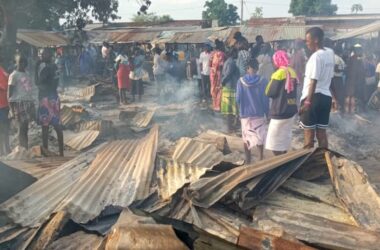By Gladys Fred Kole
An initiative of Kajo-Keji County youth in Juba to establish a pool of standby voluntary blood donors to serve anemic community members bears fruits.
The drive to have a pool of standby volunteer blood donors to save lives of the community members was launched over the weekend.
However, the charity initiative to support the community with blood transfusion access was first initiated three months ago and officially launched on Saturday.
Since its creation, the community charity group has registered three beneficiaries so far, of whom the standby voluntary donors have saved their lives with blood transfusions.
Speaking to the media about the launch of the initiative on the sidelines of a Kajo-Keji County community event over the weekend, Anna Modong, a health worker and part of the team, said the initiative is basically meant to save the lives of their community members in Juba.
“People are dying because of a lack of blood. These are preventable deaths that can be prevented when we have available blood,” said Modong.
She elaborated on the main reason that prompted their initiative.
“The aim is to create a pool of readily available blood donors who will be volunteers, doing it on a free-will basis, not paid. We shall call their contacts, and in case of emergencies, the community will reach out to our coordinators.” She explained.
Modong said that in the beginning, they were targeting 20 volunteer donors, but now they are looking at a 200-person pool of voluntary donors.
She added that as pioneer members, they are looking forward to accommodating more, although currently they only have two members plus the team members who are also donors.
Another pioneer member behind the idea, Lisok James, disclosed that three individuals have already benefited so far from this initiative.
“Blood transfusion in the hospital is tricky; there’s no blood, and if at all there is a blood donor, they tell you to replace it, and it becomes a little bit difficult to access blood within the hospital,” Lisok lamented.
He further explained that it’s because of the critical importance of blood, especially for patients, that they thought it wise to mobilize and establish standby blood donors in their community to help during emergencies.
“Currently, it is a community-based initiative, but we intend to see that in the future, other community members can borrow this idea and be able to save the lives of their loved ones because we are all blood donors,” he emphasized.
Meanwhile, Moi Alex Lasu, a hematologist who is also part of the team, said at the moment they don’t store the blood, but they are only creating a pool of donors who will be readily available when situations and demand call.
“Our contacts will be circulated widely to all the community members; once we are called during an emergency, we contact the donor, and they will be sent to the hospital to donate,” he clarified.
“You will first be screened before you qualify as a voluntary donor; that’s when your contact information can be added to our database. The database rotates among the members of the initiative per week; if there’s any emergency, we will call the eligible donor immediately.” Moi lamented
But he said that after donating once, the donor won’t be able to donate again for a period of four months.
According to him, “screening for qualified donors costs about 8,000 SSP per person.
He encouraged that even the community members could afford the aforementioned amount.
However, if one is not in a position to get that 8,000 SSP for screening, Moi advises them to seek help from stakeholders, community leaders, and government officials to get money for this important cause.
“8,000 per person means 8,000,000 can screen 1,000 donors. The aim is for this to continue for generations to come until the national blood transfusion program established meets the needs of the country’s population,” Moi noted.
Kaku Hariet Kenyi, a laboratory technician who doubles as the chairperson of the community youth-led charity initiative, pointed out that by the time this idea grows, it will not only end here in Juba but also reach the countryside.
“That one is going to be a massive blood donation; there’s a hospital, and they will be able to store the blood and keep it for emergencies; for now, it is for Juba here.” Kaku said.
In June this year, the director-general of South Sudan’s National Blood Bank said the country’s blood bank is running low due to a lack of blood donations.
He disclosed this at an event in Juba held to mark “World Blood Donor Day.
Patients with injuries during accidents, pregnant women, and children need blood at several health facilities throughout the young East African nation.




